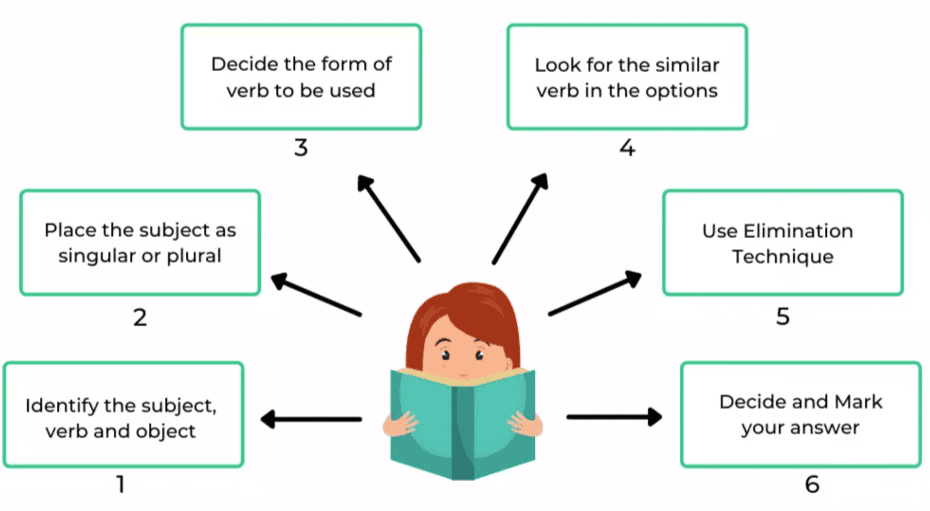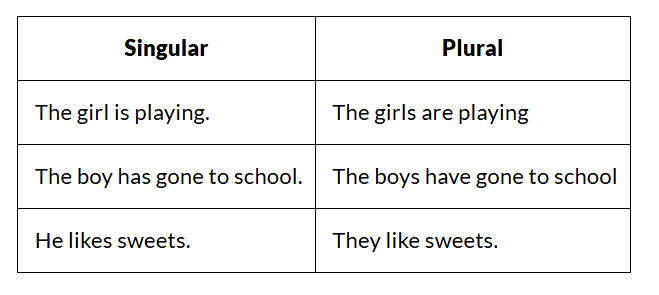Detailed Notes: Subject-Verb Concord | English Grammar Advanced - Class 10 PDF Download
Introduction
Subject-verb concord, also known as subject-verb agreement, is an essential aspect of English grammar. It ensures that the subject and the verb in a sentence agree in number and person. In other words, a singular subject should have a singular verb, and a plural subject should have a plural verb. This chapter focuses on understanding and applying subject-verb concord correctly.
A verb must agree with its Number and Person.
In other words, the Verb of a sentence agrees with the Number and Person of the Subject of that sentence. Steps to solve Subject - Verb Agreement
Steps to solve Subject - Verb Agreement
Error of Proximity
Often, the ‘Verb’ is made to agree in number with a norm near it instead of its proper Subject. It is an error. This common error is called the ‘Error of Proximity’. It should be avoided. The verb must agree with its proper Subject.
The sentence no 2 is wrong because in it the verb ‘were’ is wrongly agreed with the noun ‘apples’ near it. It is an Error of Proximity.
1. Number
The basic principle of Subject-Verb agreement is that singular subjects need singular verbs. Plural subjects need plural verbs:
2. Person:
The rules regarding the person are as follows:
(i) The first person singular or plural takes a singular verb:
- I like this scenery.
- We like this scenery.
(ii) The second person singular or plural takes a singular verb:
- You like this scenery.
(iii) The third person singular takes a singular verb:
- He likes this scenery.
(iv) The third person plural takes a plural verb:
- They like this scenery.

3. Uncountable Noun:
When we use an uncountable noun as the subject of a verb, we use a singular form of the verb:
- Honesty is the best policy.
- Fear begins to haunt him.
4. Singular and Plural Nouns:
When we use a singular noun as the subject of a verb, we use a singular verb. Plural nouns take a plural verb:
- The moon was shining in the sky.
- The sun is about to set.
- The children were swimming.
- The farmers were ploughing.
5. One of + Plural Noun:
When the subject consists of ‘one of + plural noun’, the verb is singular:
- One of the girls was singing.
- One of the students was talking.
- One of the birds was chirping.
6. Long Subject:
When a clause or a long group of words is the subject, we have to be careful to make the verb agree with the subject:
- The chairs which I bought yesterday are very costly.
- The woman whom I met in the market was my friend’s sister.
7. Introductory ‘there’:
The verb has to agree with the real subject that follows the introductory there. If the subject is singular, then 'there' will be followed by a singular verb. If the real subject is plural, then ‘there’ will be followed by a plural verb:
- There is no chair in the room.
- There are no chairs in the room.
- There are fifty boys in the class.
- There is one girl in the class.
8. Two or More Nouns:
When two or more nouns function as a subject, a plural verb is used:
- Satish and his sister have gone to see a movie.
- My friend and his father are meeting us tomorrow.
9. Distances, Weight, etc:
For distances, weight, height or amounts of money, we use a singular verb even when the subject is plural:
- Ten thousand rupees is not a small sum.
- Three kilometres is a small distance.
- Five hundred feet above sea level is not a great height.
10. Plural Names:
The title of a book, the name of a house or a hotel in plural takes a singular verb:
- “The Arabian Nights” has interesting stories.
- “The Hotel Brewers” is a five-star hotel.
11. Plural Nouns with Singular Meaning:
Nouns which are plural in form but singular in meaning usually take a singular verb:
- Mathematics is not an easy subject.
- Economics is a dull subject.
- Measles is an infectious disease.
- The latest news is that the criminal has been arrested.
12. Singular Nouns with Plural Verb:
Some nouns which appear to be singular in form take a plural verb:
- The police have arrested three terrorists.
- The Indian cricket team won the match.
13. Collective nouns like group, crowd, flock, regiment, etc. are generally followed by a singular verb:
- A group of boys was playing in the ground.
- A crowd of people rushes into the hall.
- A regiment of soldiers was marching towards the town.
14. ‘Class’ nouns such as food, furniture, clothing, etc., take a singular verb:
- This furniture is very old.
- This imported cutlery is very costly.
- His clothing consists of a bulletproof jacket, a pair of blue trousers and some other items.
15. Some nouns which appear to be plural in form when preceded by a pair take a singular verb, for example, shoes, scissors, trousers, etc.
- A pair of scissors was taken out of the drawer.
- A pair of trousers was washed by the servant.
- A pair of shoes was bought by him.
But when these nouns are used without ‘a pair of’, they take a plural verb:
- His shoes have worn out.
- My scissors do not cut well.
16. Some nouns are preceded by a lot of, a plenty of, a great deal of, etc.
These nouns take a singular verb when they refer to an amount or quantity. But they take a plural verb when they refer to a number:
- A lot of people visit the exhibition.
- Plenty of water was supplied to the villagers.
17. When a singular subject is joined by as well as, in addition to, except, etc., with another noun or pronoun, we use a singular verb.
- Sohan, as well as his brother, has come.
- My father, in addition to our neighbour, has gone out for a walk.
- Everyone except Satish was present.
18. A singular verb is used with singular pronouns,
Examples: each, either, neither, anyone, etc.
- Each of the boys was given a prize.
- Neither of the students was absent.
- Everybody has helped her.
19. When two or more subjects are connected by nor or or, the verb is used according to the number of the noun nearest to it:
- Neither she nor her sisters visit the temple.
- Either they or he is telling a lie.
20. A collective noun, such as jury, committee, family, etc., takes a singular verb when it is considered one unit. But when they are regarded as individuals, they take a plural verb:
- The jury is about to give its decision.
- The jury are divided in their opinion.
- The committee is meeting tomorrow.
- The committee have decided to raise the membership fee.
- Our family has decided to visit Shimla this summer.
- The family now live in London.
21. When some nouns are regarded as one unit, they take a singular verb:
- Bread and butter is a wholesome food.
- Brick and stone is lying scattered all over the place.
- Time and tide waits for none.
- The novelist and poet is dead.
|
54 videos|177 docs|40 tests
|
FAQs on Detailed Notes: Subject-Verb Concord - English Grammar Advanced - Class 10
| 1. What is subject-verb concord and why is it important in English grammar? |  |
| 2. What are some common errors related to subject-verb concord? |  |
| 3. How can one practice improving subject-verb concord skills? |  |
| 4. Are there exceptions to the rules of subject-verb concord? |  |
| 5. How can I identify subject-verb concord errors in my writing? |  |

















